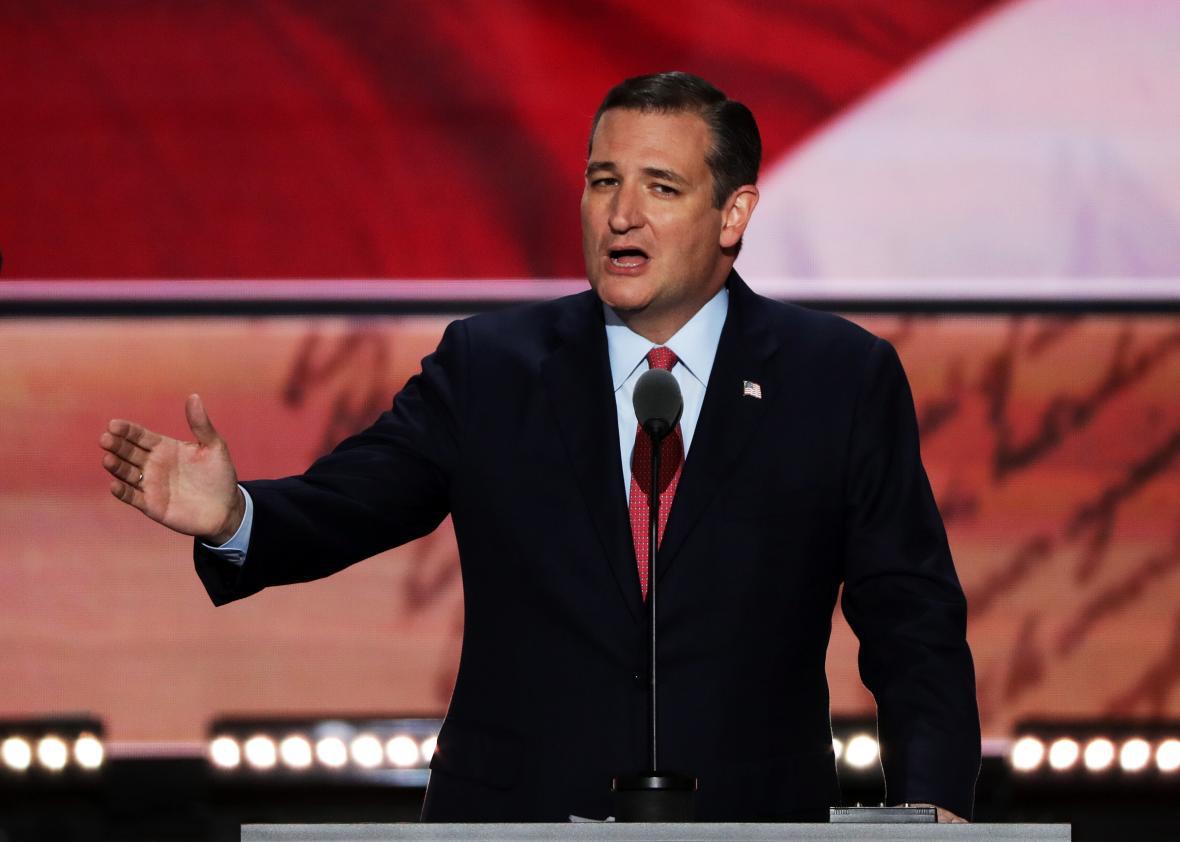When Ted Cruz took the stage in Cleveland on Wednesday night, he shockingly offered an anti-endorsement of Donald Trump—and he used carefully calibrated language to do so. “Don’t stay home in November,” he implored the conventiongoers, promoting time-tested ideals of civic engagement and responsibility. “Stand and speak and vote your conscience.” That was it: no subsequent mention of the Republican Party’s official nominee, no rousing foretaste of the glorious changes Trump would enact in office. “Vote your conscience,” Cruz instructed, like a teacher urging students to adhere to the honor code while he stepped out of the room. The arena erupted in boos.
As my colleague Jim Newell noted, Cruz’s phrasing subtweeted a lot of the “Never Trump” tumult that preceded his appearance. The senator’s supporters had attempted to slide a “conscience clause” into the party rule book that would unbind the delegates, relieving them of the obligation to vote Trump. The measure failed, and then a petition demanding a roll call vote on the rules got snuffed. In that context, “saying ‘vote your conscience’ wasn’t just a non-endorsement of Trump,” Newell concluded, “it was a big kiss blown to the anti-Trumpers, thanking them for their service in Cleveland.”
But conscience signified something to Republicans long before it joined the Cruz side of the Trump-Cruz tug-of-war. Since Barry Goldwater’s seminal 1960 book Conscience of a Conservative, the word has suggested a uniquely right-wing brand of protest, a principled and individualistic challenge to the status quo. Conscience is how Republicans defy the government—it’s their take on civil disobedience or conscientious objection (two concepts historically aligned with the left). And it has blended in fascinating ways with the GOP’s Christianity, positing the idea that in each citizen thrums a kind of spiritual core that must remain unsullied by politics.
In Conscience of a Conservative, Goldwater writes that “the first principle of totalitarianism” is “that the State is competent to do all things and is limited in what it actually does only by the will of those who control the State.” (What would he make of Trump’s authoritarianism?) Meanwhile, the ideal government gets out of the way so that its citizens can follow their own lights. Goldwater felt that a person needed to lead a sacred portion of his life beyond the scope of the state, in an autonomous, pristine space devoted to the cultivation of conscience: “Conservatism therefore looks upon the enhancement of man’s spiritual nature as the primary concern of political philosophy” (itals mine).
So when conservative politicians invoke “conscience,” that prize jewel of the individual psyche, they are often staking out a moral objection to something the “majority”—and especially the political majority—seems to support. For instance, John McCain broke ranks with much of his party when he condemned the practice of waterboarding in a 2014 speech on the Senate floor. Terrorists “act without conscience,” he said, “but we must not.”
Or consider Mitt Romney declaring last month that his “conscience” wouldn’t permit him to cast a ballot for either Clinton or Trump. “It’s a matter of personal conscience. I can’t vote for either of those two people,” he admitted to John Dickerson in an interview at the Aspen Ideas Festival.
Or think of the Conscience Protection Act, a bill proposed by the Republican congresswoman Diane Black and lifted to prominence by Speaker of the House Paul Ryan. The measure hits back at Roe v. Wade, offering cover to health care providers that refuse to perform abortions as “a matter of conscience.”
In all these cases, conscience is what one might call the personal—especially the spiritualized personal—when it clashes with the political. Even the alternative interpretations of Cruz’s non-endorsement are rooted in the senator’s individual psychology—they are intimate character judgments, not suppositions about his policy aims. “I think it was something selfish,” said Chris Christie after the speech. Meanwhile, radio host Laura Ingraham attributed the never-Trump crowd’s moral distaste for the nominee to “wounded feelings and bruised egos.”
But conscience as a political force is about more than that, and its early historical displays have an almost preternatural resonance with Cruz’s convention address. In 1844, troubled by the rise of the nativist, hate-fueled “Know Nothing” party, Abraham Lincoln convened a gathering of fellow Whigs. “He did not believe the political ostracism of foreign-born voters was Christian,” writes John Wesley Hill in his 1920 book, Abraham Lincoln, Man of God. And so, with a xenophobic movement threatening “to sweep the country and place Proscriptionists in power,” Lincoln introduced a resolution defending his homeland against “intolerance and disorder.” “RESOLVED,” it read, “that the guarantee of the rights of conscience, as found in our Constitution, is most sacred and inviolable … and that all attempts to abridge or interfere with these rights … directly or indirectly, have our decided disapprobation.”
